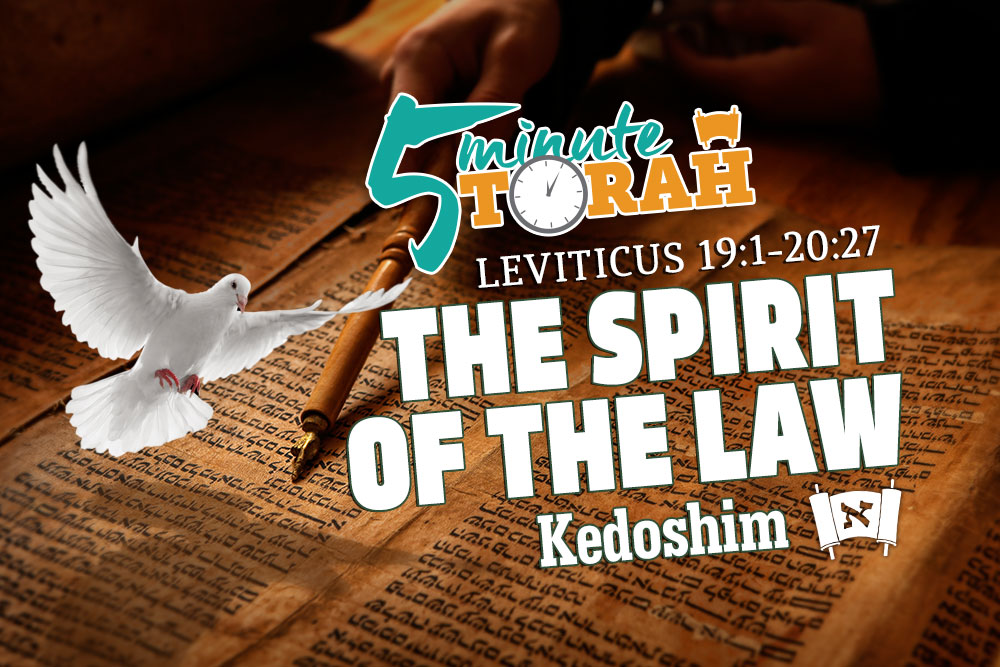The Spirit of the Law
Series:

Parashat Kedoshim (Leviticus 19:1-20:27)
Parashat Kedoshim is primarily focused on practical, ethical laws that will set Israel apart from her surrounding nations. It begins with the directive, “You shall be holy, for I the LORD your God am holy” (Leviticus 19:2). But when Hashem gives this instruction, He tells Moses to speak this “to all the congregation of the people of Israel.” The way Hashem addresses the Children of Israel is unique to this event. Let’s take a look at why this is the case.
So far in the book of Leviticus, most of the instructions have been to Aaron and his sons, and then to the priesthood in general. In our previous portion, the LORD expands His instructions from the priesthood to the nation as a whole by saying, “Speak to Aaron and his sons and to all the people of Israel” (vs. 17:2). Now, He specifies that these instructions are to be heard by “all the congregation of the people of Israel.” In other words, whereas the previous instructions to the Children of Israel could be relayed to anyone not present during Moses’ teaching, this time He wants every individual to be present (hence “the congregation”) so that they can hear these important mitzvot.
What’s so important about these particular commandments? Hasn’t the Torah given some very important ones already? Evidently, the mitzvot that are contained in this section of the Torah have some critical bearing on both the nation as well as the individual. They include things like taking care of the poor, honest business dealings, impartiality in court, not bearing grudges, honoring parents and elders, and not giving into temptations to look and act like the people around them. This is a short list of things intended to make Israel stand out as a holy nation, consecrated to the LORD. But there is a problem in trying to establish parameters of holiness.
In his long commentary on this verse, Nachmanides makes the famous statement that it is possible to be “disgusting with permission of the Torah.” What does he mean by this? He is saying that one may follow the most literal instructions of the Torah and still be a despicable human being. How is this possible? Because the Torah can only give general boundaries for things such as integrity, fairness, kindness, respect, and wholesome speech. It doesn’t have the ability to legislate character. This is why the Mishnah and Talmud work to define what it means to be respectful, honest, equitable, etc. But even with this someone will always find a legal loophole to be a foul human being.
We can even see this today among the followers of Yeshua. Although the Apostolic Scriptures are heavy on ethical teachings and emphasize the importance of proper character, there are still people who claim to be disciples of Yeshua who find ways to skirt around these restrictions. This is why Paul is able to say, “the letter kills, but the Spirit gives life” (2 Corinthians 3:6). He prefaces this statement by saying that as disciples of Yeshua we are “ministers of a new covenant, not of the letter but of the Spirit.” Paul makes this statement as an allusion to the New Covenant passage in Jeremiah. The LORD used the prophet Jeremiah to tell us what it will be like when the New Covenant is fully in effect:
For this is the covenant that I will make with the house of Israel after those days, declares the LORD: I will put my law within them, and I will write it on their hearts. And I will be their God, and they shall be my people. And no longer shall each one teach his neighbor and each his brother, saying, ‘Know the LORD,’ for they shall all know me, from the least of them to the greatest, declares the LORD. (Jeremiah 31:33–34)
Although Yeshua inaugurated the New Covenant, we are still waiting its fullness. Paul wanted to communicate to his readers that as disciples of Yeshua they should be evidence of this reality. The evidence of the New Covenant is a renewed heart which bends its will to the Divine will.
Being within the technical boundaries of Torah (God’s will on earth) does not necessarily mean one’s heart is in the right place. It just means that I am doing what is expected of me. No more. And although there is merit in adhering to the strict letter (the halachic boundaries) of the Torah, there is much more when we go above what the Torah requires. We have to live our lives according to the Spirit of the Law. What does this mean? It means approaching the Torah as Yeshua taught us.
The letter of the Law says don’t commit adultery. The Spirit of the Law says don’t have wondering eyes and lustful thoughts. The letter of the Law says don’t murder. The Spirit of the Law says don’t nurse anger. The letter of the Law says that when someone does wrong against you or your property you have the right to file civil action against them for damages. The Spirit of the Law says forgive them and leave it up to them to make things right.
Disciples of Yeshua are called to live this standard of holiness, just as Peter (quoting our Torah portion) tells us, “As he who called you is holy, you also be holy in all your conduct, since it is written, ‘You shall be holy, for I am holy’” (1 Peter 1:15–16). Living by the letter of the Torah is the minimum. But disciples of Yeshua should go beyond the letter and live by the Spirit of the Torah, infusing this world with godliness so that the world may see our good deeds and glorify our Father in heaven.








